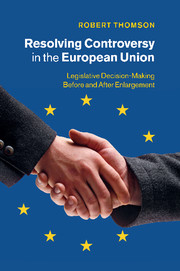 Resolving Controversy in the European Union
Resolving Controversy in the European Union from Part III - Outputs
Published online by Cambridge University Press: 07 October 2011
Delegating discretion to resolve controversy
Decision outcomes differ from each other in the extent to which they specify the details of policies to be followed by implementers. Some decision outcomes contain detailed rules that give implementers little or no opportunity to interpret decisions in different ways. Other decision outcomes delegate considerable room for manoeuvre to implementers. In this chapter, a decision outcome is said to delegate discretion to an implementer if the implementer can take one of two or more policy actions and still comply with the law of which the decision outcome is part.
In most political systems, decision makers delegate at least some discretionary power to implementers (e.g., Hawkins et al. 2006). Decision makers often argue that this is appropriate, because implementers can use technical knowledge that decision makers lack to fill in the details of policies. Moreover, implementers with discretionary power can react dynamically to unforeseen developments within the same general policy framework set by their political masters. The danger of delegating discretionary power to implementers is that implementers may carry out policies that are not in line with decision makers’ preferences, behaviour known as ‘bureaucratic drift’. If implementers have more information about policies and their effects than decision makers, it may be difficult for decision makers to detect and sanction policy drift. Consequently, in political systems around the world, decision makers must balance the costs and benefits of delegating discretionary power to implementers when formulating decision outcomes.
To save this book to your Kindle, first ensure [email protected] is added to your Approved Personal Document E-mail List under your Personal Document Settings on the Manage Your Content and Devices page of your Amazon account. Then enter the ‘name’ part of your Kindle email address below. Find out more about saving to your Kindle.
Note you can select to save to either the @free.kindle.com or @kindle.com variations. ‘@free.kindle.com’ emails are free but can only be saved to your device when it is connected to wi-fi. ‘@kindle.com’ emails can be delivered even when you are not connected to wi-fi, but note that service fees apply.
Find out more about the Kindle Personal Document Service.
To save content items to your account, please confirm that you agree to abide by our usage policies. If this is the first time you use this feature, you will be asked to authorise Cambridge Core to connect with your account. Find out more about saving content to Dropbox.
To save content items to your account, please confirm that you agree to abide by our usage policies. If this is the first time you use this feature, you will be asked to authorise Cambridge Core to connect with your account. Find out more about saving content to Google Drive.